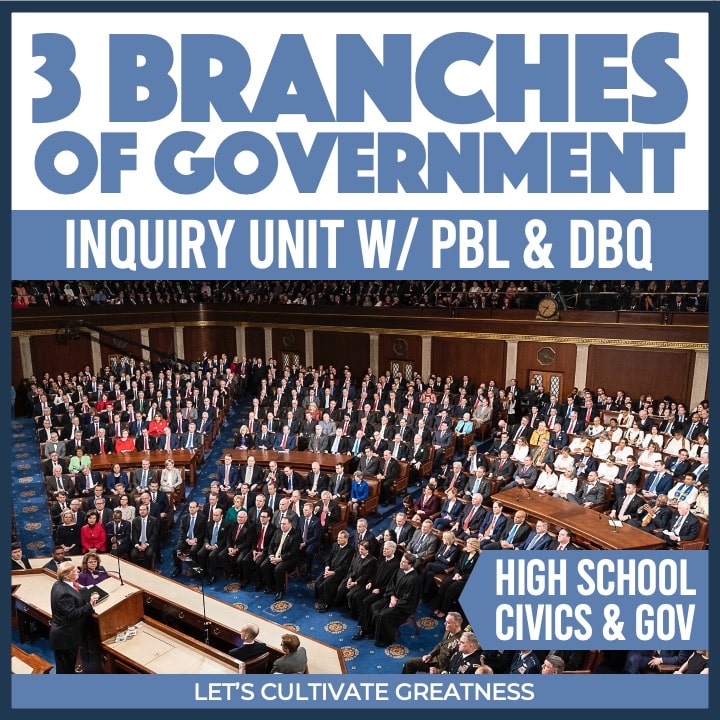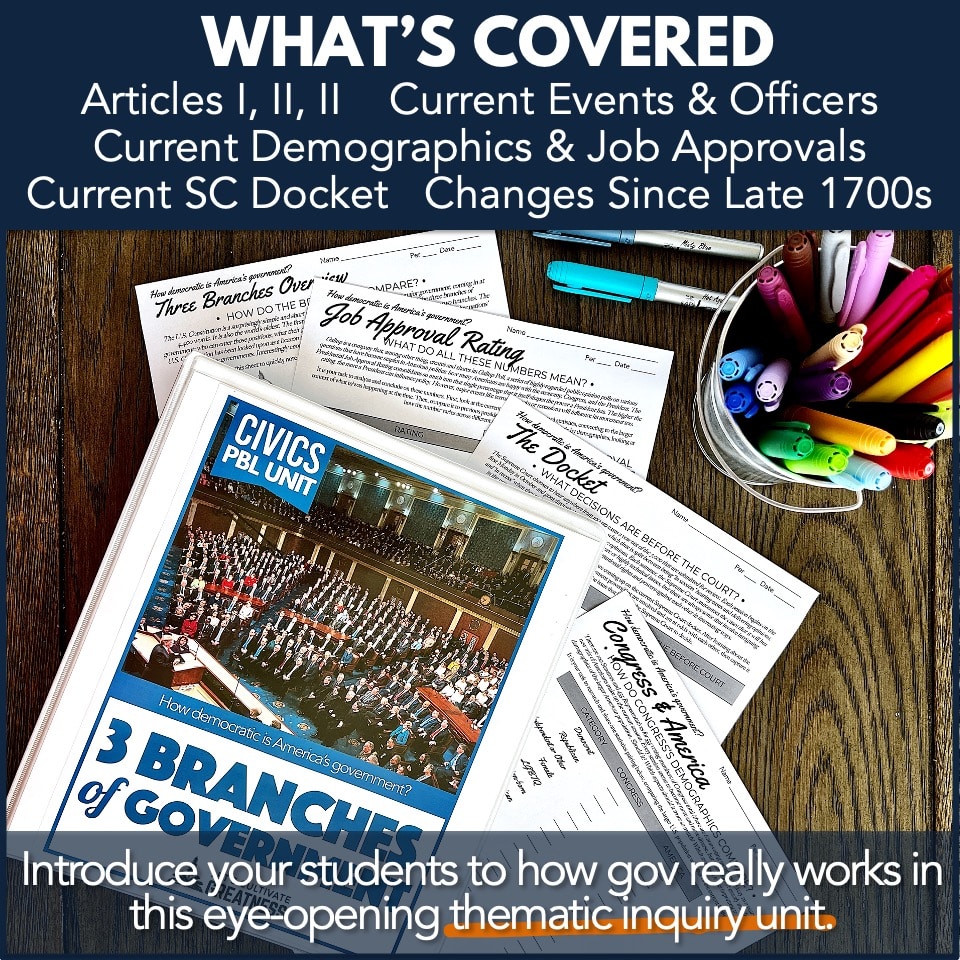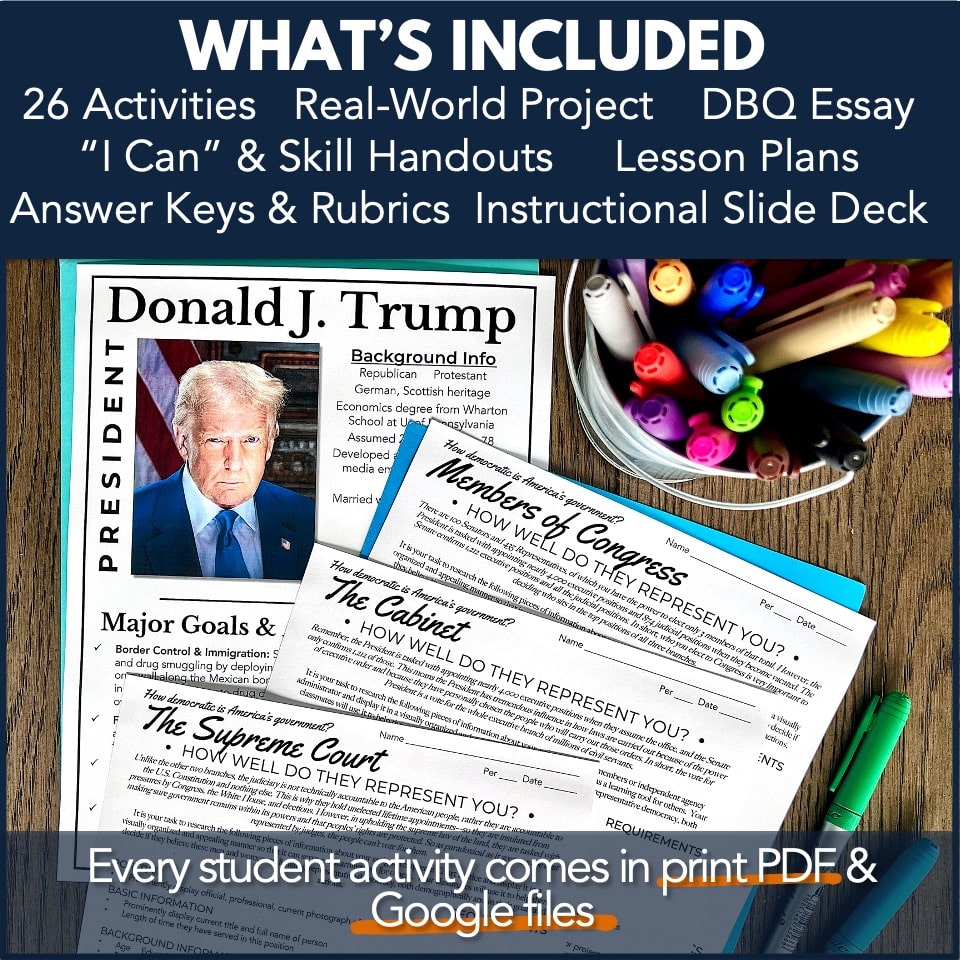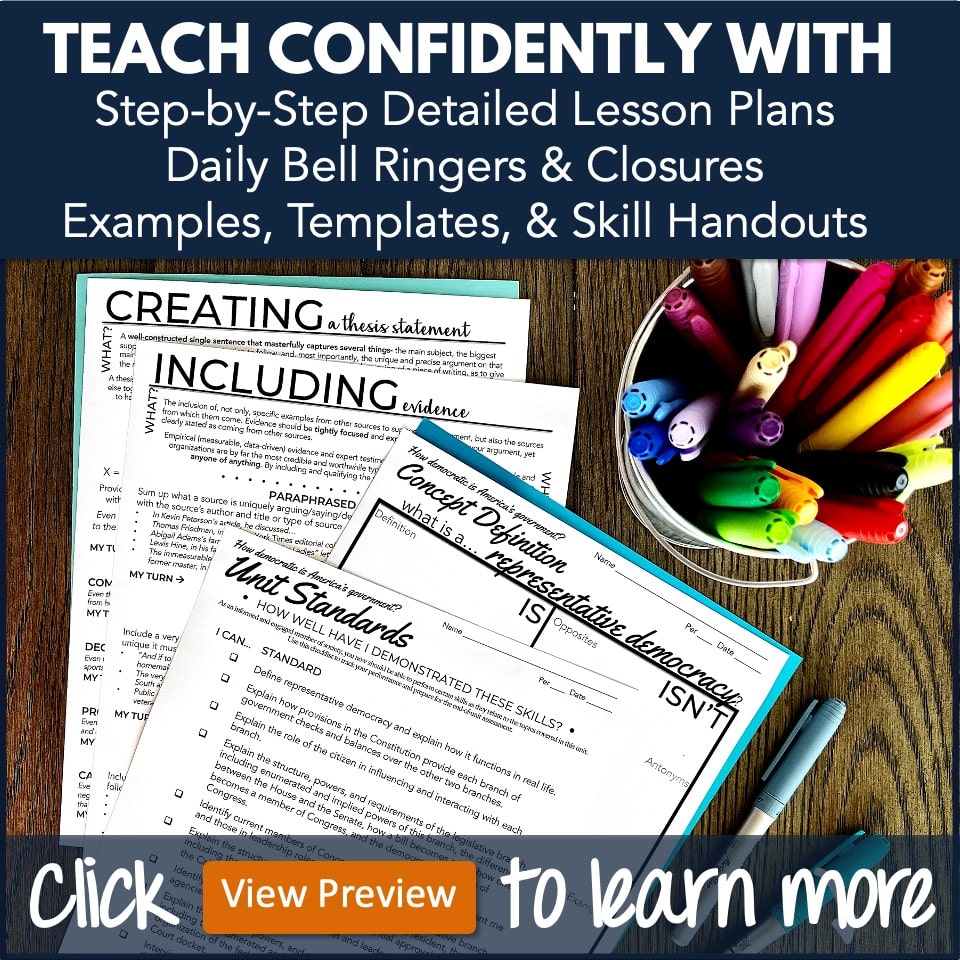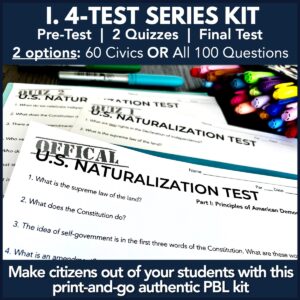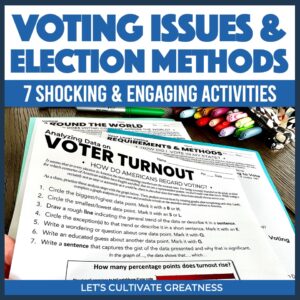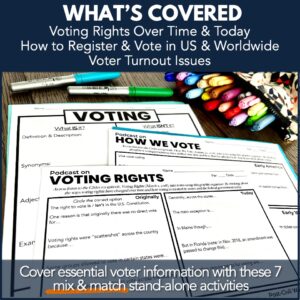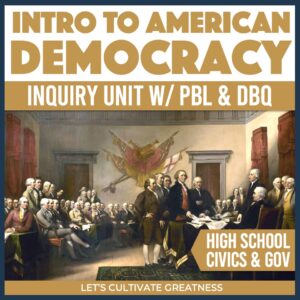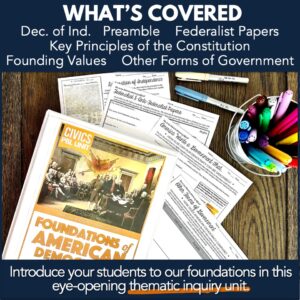Three Branches of Government Inquiry PBL & DBQ Unit
$29.95
Explore the 3 Branches of Government with a critical lens, everything from the text of Articles I, II, and III and checks and balances to current members of Congress, the Cabinet, and the Supreme Court.
This inquiry-driven, source-based PBL unit asks students to answer, “How democratic is America’s government really?”
Description
An inquiry unit immediately makes abstract concepts into intriguing and relevant lessons.
Each activity is driven by a guiding question that builds towards the unit question as well as has students exploring current issues and relevant examples.
The unit culminates with students answering the question in a DBQ-style essay and an optional authentic PBL project.
This unit can be done well in between six to eight weeks and has been crafted to support the standards of various states.
Included in this complete Three Branches of Government unit:
Overview
- Teacher Unit Overview with general notes, links, standards, and a pacing guide
- Daily Lesson Plans with step-by-step details, planning, and lesson takeaway notes
- Detailed Answer Keys for each activity
- Instructional Slide Deck slides to support activities and essay writing
- Student Unit Review and Skills handouts with self-checking questions and “I Can…” statements
- Student Unit Notes sheet for building deep and nuanced mastery of concepts over the course of the unit using powerful graphic organizers
- Student Skill Handouts that include Analyzing News Media Sources, Analyzing Political Cartoons, Deciding a Precise Position, Creating a Thesis Statement, and Including Evidence
Student Activities
- Unit Hook brainstorm, then examine the most effective ways to speak up to your representatives from a political insider
- Three Branches Comparison Chart and Checks & Balances Flowchart build on these reference notes throughout the whole unit
- The Legislative Branch closely read Article I, listen to two engaging podcasts, create a gallery walk of posters for members of Congress, collaborate card sort to learn how bills become a law, and compare Congress’s demographics against America’s
- The Executive Branch closely read Article II, listen to two engaging podcasts, create a gallery walk of posters for members of the Cabinet, simulate the Electoral College, and analyze and compare Presidential job approval rating numbers from past and present
- The Judicial Branch closely read Article III, listen to two engaging podcasts, create a gallery walk of posters for members of the Supreme Court, and analyze cases on the current docket
- Political Cartoon & News Media Analysis blank forms tailored to each branch to use with your own current events media sources
- Print PDF & editable Google versions of all student sheets included!
2 Summative Assessments
- DBQ Essay support your students with a collaborative brainstorm review activity, detailed instructions, outline template, sentence stems, step-by-step PPT slides, and rubrics that encapsulate their complete understanding by arguing their answer to the not-so-simple question, “How democratic is America’s government really?”
- Interview Narrative Essay Project after guiding students through thoughtful analysis, prepare them to interview a community member about their thoughts on how well America’s government is working, capturing the experience in a narrative essay (plus thank you note!) with step-by-step how-to guides and forms
ELL & Neurodiversity Supports
- Icon images and graphic organizers in activities to assist in concept understanding
- Collaborative, small-group activities that utilize spatial and kinesthetic skills and promote low-stakes student talk
- How-to skill sheets for essay writing skills
- Clear fonts and visual organization best practices used assignment sheets
This resource is 184 PDF pages, plus Google files.
What grades is this intended for?
This was designed at a mixed-ability high school level. I cannot guarantee it for grades younger than that, though middle school teachers have reported success with the units in this course.
If you teach middle school, you may succeed best with the stand-alone activity kits available.
What supports are included? How can I modify this?
Activities are built with included supports to accommodate varying needs within a typical on-level course: images, sentence stems, graphic organizers, chunking, small-group and low-stakes student talk, manipulatives, how-two skill sheets, step-by-step essay and project forms, etc.
Student materials come in editable Google file versions to allow you to modify activities by shortening, re-leveling, translating, or using text-to-speech software to support student needs.
Can I use this in a homeschooling setting?
Sure! While this unit was designed with a traditional classroom setting in mind, it can be used in a solo or a small-group setting without too much tweaking.
Is this editable? What file types does this resource come in?
The main resource is a secured, non-editable PDF file intended to be printed. Included are links to editable Google files of all the student materials.
What standards does this address?
Several! Standards vary, but this resource supports these from various states:
- Analyze the structure and functions of the legislative branch, including the bicameral structure of Congress, the role of committees, and the procedures of enactings laws
- Analyze the structure and functions of the executive branch, including the constitutional powers of the president, the growth over time of presidential power, and the role of the Cabinet and executive departments
- Analyze the structure and functions of the judicial branch, including the federal court system, types of jurisdiction, and unique characteristics of the Supreme Court
- Analyze primary sources, determining central idea, citing textual evidence, and identifying author’s point of view and purpose
- Integrate multiple sources in diverse formats in order to form a coherent understanding and address a question
- Write argument focused on discipline-specific content, developing claim and counterclaim, selecting most signfignat pieces of evidence, using precise domain-specific language, and organizing ideas into a coherent arugment
- Make personal and real-world connections and refections to content
What are the terms of use for this resource?
This resource, including all ancillary files, may be used as needed for regular, non-commercial single-classroom use between a teacher and their students.
This includes printing copies and sharing digital files with students through a secure platform, like Google Classroom or Canvas, email, or a classroom-only shared drive.
The using and sharing of any part of this resource in any manner outside the above-mentioned capacity is strictly prohibited. Prohibited uses include, but are not limited to,
- posting files on the open internet or in a Facebook group
- emailing files to or sharing print copies with others (without purchasing additional licenses)
- uploading or storing files in a shared cloud drive accessible by anyone other than students
- including any part, or any derivative work, within any commercial endeavor like curriculum development, professional training, or for-profit teaching like Outschool, or selling this resource as your own in either print or digital formats
Doing so violates the Digital Millennium Copyright Act (DMCA), copyright law, and these terms.
By downloading this resource from Let’s Cultivate Greatness, the original user has been granted one license for a single teacher (or number of teachers matching the number of licenses purchased) and their students at any one time.
Let’s Cultivate Greatness retains the full copyright of this resource.
The resources included helped to connect the branches of government to everyday life. It was a great project with LOTS of good resources and information! – Kelsey F.
Absolutely love all the resources you make! It saves so much time, is on level and provides different styles of learning to gain the knowledge necessary. Thank you! – Jennifer T.
I will eventually purchase all your resources as they are expertly done and updated. There are not enough adjectives to describe the depth and usefulness of these units. Thank you!! – Kara G.

